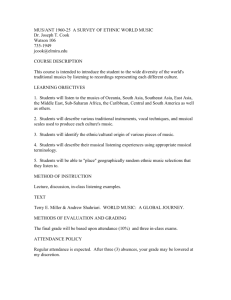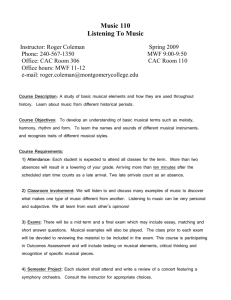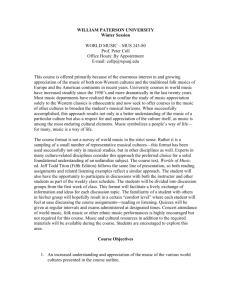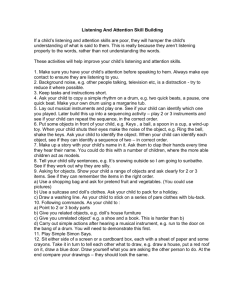MUSI 150 Young syllabus Spring 2012
advertisement
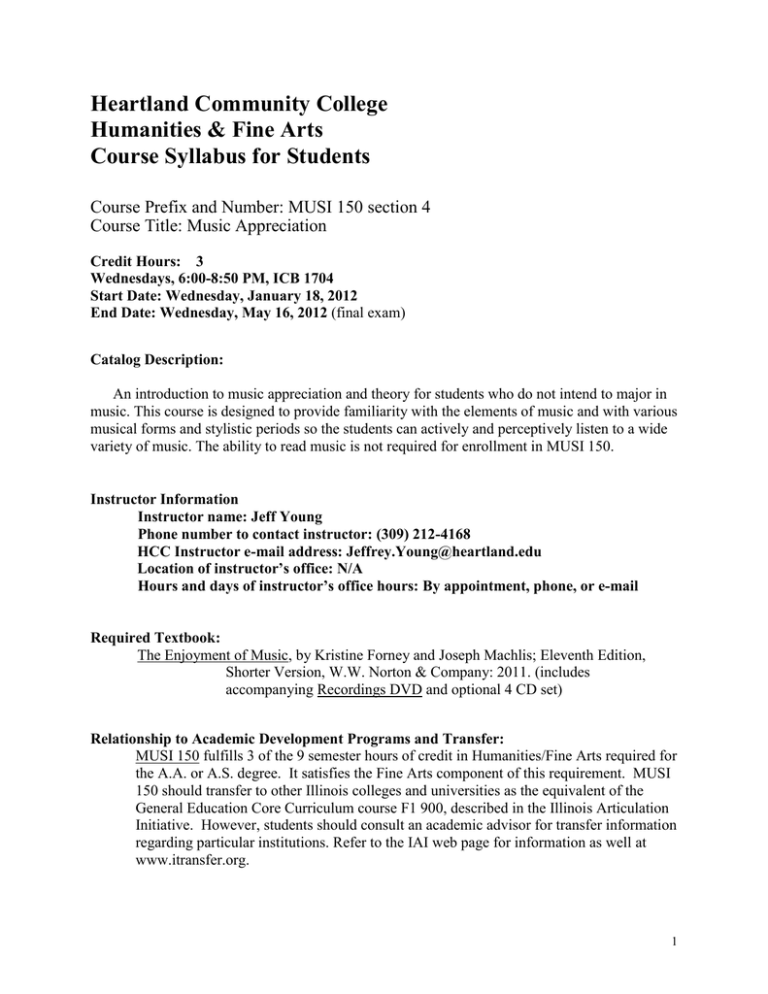
Heartland Community College Humanities & Fine Arts Course Syllabus for Students Course Prefix and Number: MUSI 150 section 4 Course Title: Music Appreciation Credit Hours: 3 Wednesdays, 6:00-8:50 PM, ICB 1704 Start Date: Wednesday, January 18, 2012 End Date: Wednesday, May 16, 2012 (final exam) Catalog Description: An introduction to music appreciation and theory for students who do not intend to major in music. This course is designed to provide familiarity with the elements of music and with various musical forms and stylistic periods so the students can actively and perceptively listen to a wide variety of music. The ability to read music is not required for enrollment in MUSI 150. Instructor Information Instructor name: Jeff Young Phone number to contact instructor: (309) 212-4168 HCC Instructor e-mail address: Jeffrey.Young@heartland.edu Location of instructor’s office: N/A Hours and days of instructor’s office hours: By appointment, phone, or e-mail Required Textbook: The Enjoyment of Music, by Kristine Forney and Joseph Machlis; Eleventh Edition, Shorter Version, W.W. Norton & Company: 2011. (includes accompanying Recordings DVD and optional 4 CD set) Relationship to Academic Development Programs and Transfer: MUSI 150 fulfills 3 of the 9 semester hours of credit in Humanities/Fine Arts required for the A.A. or A.S. degree. It satisfies the Fine Arts component of this requirement. MUSI 150 should transfer to other Illinois colleges and universities as the equivalent of the General Education Core Curriculum course F1 900, described in the Illinois Articulation Initiative. However, students should consult an academic advisor for transfer information regarding particular institutions. Refer to the IAI web page for information as well at www.itransfer.org. 1 Course Objectives (Learning Outcomes): After completing this course, the student will: 1. 2. 3. 4. 5. 6. 7. Identify the works of music that are considered to represent the greatest achievements of various cultures and civilizations and that have defined these civilizations' musical traditions (D2). Listen to music with sensitivity and formal understanding (C5). Recognize various periods, mediums, and themes in music. Become aware of various musicians' styles and begin to appreciate how and why music changes over time as well as sometimes within an individual artist's career (C5). Understand the fundamental conceptual and theoretical framework that underlies the production of music in different cultures (D3). Develop the confidence to pursue specific areas of music on a more advanced level (P8). Identify appropriate topics for scholarly research in music appreciation, utilize standard bibliographic and other research tools, select suitable sources and methodology, and write papers presenting the results of your research while observing the conventions of scholarly discourse (C6). Course/Lab Outlines: I. ELEMENTS OF MUSIC (unit 1) II. THE BAROQUE PERIOD (unit 2) III. THE CLASSICAL PERIOD (unit 2) IV. THE ROMANTIC PERIOD (unit 3) V. MODERN ART MUSIC (unit 4) VI. JAZZ, BLUES & ROCK MUSIC (unit 4) Methods of Instruction Due to the length of our class period, each class meeting will contain multiple types of instructional activities. While the main method of instruction will be lecture, each class period will also include instruction from the following methods: multimedia presentation, in-class listening or viewing, listening combined with written observations, class discussions, and student presentation. Course Policies Methods of Evaluation (Tests/Exams, Grading System) Final grades will be awarded according to the following scale: 92-100 % =A 83-91 % =B 74-82 % =C 65-73 % =D Below 65%=F 2 The following chart outlines how grades will be given: Feature Unit Exams Listening Exams CD Analysis Paper % of overall grade Purpose 30% 15% 15% demonstrating knowledge and comprehension of readings and in-class lectures and discussions demonstrating aural familiarity with listening assignments and musical elements Brief Description/ Requirements multiple choice, true/false, matching, formal essay NO open note or open book 1) identifying significant musical works from class 2) identifying musical elements and characteristics in unfamiliar works 4 exams at end of each unit (3 highest scores count toward final grade) NO open note or open book Short quiz at end of each unit (3 highest scores count toward final grade) Length and frequency of evaluation Live Performance Attendance 15% In-class Participation 25% displaying critical listening skills and awareness of musical elements; showing good writing skills; researching and citing sources choosing a recording, giving observations and value statements; proper citation and bibliography of sources used observing a meaningful performance; displaying critical listening skills, evaluation of performance engaging in meaningful discussions and written analysis of in-class listening must submit copy of the program and fill out a brief questionnaire; further guidelines will be provided later One paper, 5 pages long (see requirements below) One performance during the semester includes written observations of in-class listening, verbal discussion of listening, and showing evidence of class preparation; also 1 in-class presentation Every class period (excludes exam periods) Participation/Attendance Policy Your success in the class (and ultimately, your grade) will likely reflect your rate of attendance. In-class assignments, as specified above, cannot be made up. Any absence will result in a zero for that week’s participation grade. While one or two absences will not significantly affect your participation grade, excessive absences likely will. Keep in mind that your mere presence in a class period does not guarantee full participation points. Your participation grade also relies on meaningful participation in discussions and activities. Aside from your participation grade, absences will certainly affect the degree to which you comprehend and absorb material covered in assigned readings. Bear in mind that, since this course only meets once a week, missing one class period would be similar to missing three class periods in a traditional course. Part of your participation grade (5 out of 25 points) will be devoted to a short in-class presentation. This will involve selecting a song to bring in to class, giving a brief verbal introduction to that song, listening to the song, and finally, holding a brief discussion about the musical aspects of that song. This whole process should take about 15 minutes. Presentations will begin on February 22nd on a volunteer basis. More information will be provided at a later date. 3 Incompletes Policy I follow the official college policy, as found in the College catalog, as illustrated by the following excerpt: “An incomplete grade may be given to a student who, by the withdrawal date (April 12th, 2012), can reasonably be expected to pass the course. Incompletes may be granted only when justified by extreme circumstances (e.g. serious illness, accident, death or serious illness in the immediate family).” Late Assignments Policy Late assignments for full credit will be granted only at the instructor’s discretion. If you expect to get full credit for a late assignment, it is crucial that you contact the instructor before the class period in which the assignment is due. If you cannot hand in an assignment in class, contact your instructor to make arrangements to turn in the assignment by other means. Otherwise, late assignments will be accepted no later than one week after the listed due date, and will automatically be deducted by 25%. Variation from this policy will only be granted in extreme circumstances at the instructor’s discretion. Make-up Exam Policy Make-ups of written exams will only be granted in extreme circumstances and at the instructor’s discretion. You must contact the instructor BEFORE the exam period to arrange a make-up. Please do so as early as possible. Reasons for making up an exam include: collegesponsored events, permission from Disability Support Services, and documented illness. Exam make-ups will NOT be granted for employment conflicts. Make-ups of listening exams will NOT be granted under any circumstances. Listening exams must be completed in class. Everyone’s lowest exam grade will be dropped from final grades. Therefore, you could miss one exam without losing a significant portion of your grade. Students who complete all exams will also be granted this privilege. A student who is satisfied with his/her first three exam grades has the right to waive the final exam if they choose. Both your lowest written exam and listening exam will be dropped independently of one another. Live Performance Attendance Students will be required to attend ONE formal musical performance sometime during the semester. There are some requirements for what type of performance to attend. The performance should be structured to the point of having a written program available for attendees. Feel free to ask for guidance in selecting a performance to attend. Students will be given a brief questionnaire to fill out based on the performance, which should be turned in with the provided program to the performance. The goal of this assignment is to promote the listening/viewing of live performances, as well as discovery of aspects of performing as a musician. More information will be given at a later date, including the questionnaire. Writing Requirements The writing assignment in this course should be typed. Proper spelling, grammar, punctuation, etc. is expected and will affect your grade. Papers should use a size 12 font, preferably in Times New Roman font style. Each line should be double spaced for ease of reading and grading. 4 The CD analysis research paper* will include the requirement of a bibliography, as well as citing reference sources. There is no required style for this course (MLA, APA, etc), but some sort of regulated style should be used. For help in this manner, see Student Support Services, or NoodleTools is available on the Heartland Library website. *(Specific information regarding the writing assignment will be provided closer to the due date) Student Conduct Students are expected to have at each class meeting: the textbook, notebook for taking notes, notes from previous meetings, loose paper for in-class projects, and any assignments due that week. Students are also expected to come to class prepared for discussing that day’s topics. This requires that you complete reading and listening assignments. Students are expected to maintain a professional and respectful demeanor in class. Please be respectful of others in the class by refraining from conversation and distraction. If you must arrive late or leave early, please take your seat quietly or depart the room quietly. Please refrain from using cell phones or similar devices during class. Cell phones should be shut off before class to avoid disruption and distraction. Finally, everyone has different musical tastes and backgrounds. Please feel free to express your opinions and tastes candidly while maintaining a level of respect for others in the class, as well as the content of the class. Flexibility and open-mindedness will be helpful to achieve maximum learning in this course. Academic Integrity and Plagiarism Academic Integrity Academic integrity is a fundamental principle of collegial life at Heartland Community College and is essential to the credibility of the College’s educational programs. Moreover, because grading may be competitive, students who misrepresent their academic work violate the right of their fellow students. The College, therefore, views any act of academic dishonesty as a serious offense requiring disciplinary measures, including course failure, suspension, and even expulsion from the College. In addition, an act of academic dishonesty may have unforeseen effects far beyond any officially imposed penalties. Violations of academic integrity include, but are not limited to cheating, aiding or suborning cheating or other acts of academic dishonesty, plagiarism, misrepresentation of data, falsification of academic records or documents, and unauthorized access to computerized academic or administrative records or systems. Definitions of these violations may be found in the college catalog. Plagiarism Plagiarism is the presenting of others’ ideas as if they were your own. When you write a paper, create a project, do a presentation or create anything original, it is assumed that all the work, except for that which is attributed to another author or creator, is your own. Plagiarism is considered a serious academic offense and may take the following forms: 1 Copying word-for-word from another source and not giving that source credit. 2 Paraphrasing the work of another and not giving that source credit. 3 Adopting a particularly apt phrase as your own. 4 Using an image or a copy of an image without crediting its source. 5 Paraphrasing someone else’s line of thinking in the development of a topic as if it were your own. 6 Receiving excessive help from a friend or elsewhere, or using another project as if it were your own. *Note that word-for-word copying is not the only form of plagiarism. The penalties for plagiarism may be severe, ranging from failure on the particular piece of work, failure in the course or expulsion from school in extreme cases. 5 [Adapted from the Modern Language Association’s MLA Handbook for Writers of Research Papers. New York: MLA, 1995: 26] Support Services: Heartland Library Information The Library, located in the Student Commons Building at the Raab Road campus, provides Heartland students with a full range of resources including books, online journal databases, videos, newspapers, periodicals, reserves, and interlibrary loan. Librarians are available to assist in locating information. For more information please call the Library (309) 268-8200 or (309) 268-8292. HCC Writing Center The Writing Center is open to all HCC students working on their writing. HCC writing faculty help students apply course outcomes to their papers. Visit the Tutoring and Testing Center or call the TTC for an appointment: (309) 268-8231. Tutoring Center Heartland Community College offers tutoring in various forms at no cost to Heartland students at the Academic Support Center (ASC) in Normal and at the Pontiac and Lincoln Centers. Tutors are available at convenient times throughout the week. Study groups, group tutoring facilitated by a specially-trained tutor, are also available by request. For more information about services available at each location, please call the ASC in Normal (309) 2688231; the Pontiac Center (815) 842-6777; the Lincoln Center (217) 735-1731. Syllabi disclaimer Any changes to the syllabus will be made at the discretion of the instructor, or to meet changes necessary to effective instruction. The class will be promptly notified of any alterations. Course Calendar Week #/ Date Papers/ Exams Week 1: Jan 18 Course introduction, syllabus; musical elements: melody, rhythm and meter Review of musical elements + harmony, pitch organization, texture Review of musical elements + form, expression; Musical Elements ID Categories and Families of musical instruments; Voice parts; Musical Ensembles Begin Unit 1 Week 2: Jan 25 Week 3: Feb 1 Week 4: Feb 8 Week 5: Feb 15 Topics Covered Reading Assignment Listening Assignment pp. 4-29 StudySpace pp. 30-38 StudySpace pp. 39-66 DVD-ROM: Young Persons Guide… (p 60), StudySpace Exam #1 Listening Exam #1 6 Week 6: Feb 22 Baroque Period: Opera; Oratorio; Baroque Concerto; Fugue (Purcell, Handel, Vivaldi, Bach) Classical Period: Multimovement Cycle forms and characteristics; Mozart and Haydn Beethoven & his music; Mozart Classical concerto & opera Begin Unit 2 Week 7: Feb 29 Week 8: Mar 7 Mar 14 Week 9: Mar 21 pp. 106-129 pp. 136-146 pp. 150-174 pp. 174-185 pp. 189-200 Spring Break Exam # 2 Listening Exam #2 CD Analysis Paper Romantic Period: 19th century art song (Schubert, R. Schumann)19th century piano piece (Chopin, C. Schumann) pp. 204-226 Week 11: Apr 4 Programmatic works through history: drama in instrumental music (Berlioz, Smetana, Grieg) pp. 230-243 Week 12: Apr 11 Drama in vocal music: Italian & German Romantic opera pp. 252-266 pp. 275-280 Modern Art Music of the United States: Ives, Still, Copland, John Adams pp. 295-299 pp. 321-332 pp. 420-428 World Music and Contemporary Composers: John Cage, Bright Sheng, traditional examples Blues, Jazz, and Rock & Roll pp. 386-391 pp. 396-406 Week 10: Mar 28 Begin Unit 3 Week 13: Apr 18 Purcell: Dido and Aeneas Handel: Messiah Vivaldi: Spring:4 Seasons Bach: Contrapunctus I Mozart: Eine Kleine Nachtmusik mvt I & III Haydn: “Emperor” Quartet (also “Oxford” Symphony) Beethoven: Symphony #5 Mozart: Piano Concerto Mozart: Don Giovanni Schubert: Elfking Schumann: In the Lovely Month of May Chopin: Mazurka Hensel: September Berlioz: Symphony fantastique Smetana: The Moldau Grieg: Peer Gynt Verdi: Rigoletto Wagner: Die Walkure Puccini: Madame Butterfly Exam #3 Listening Exam #3 Week 14: Apr 25 Begin Unit 4 Week 15: May 2 Week 16: May 9 Performance Attendance assignment Week : May 16 Exam #4 Listening Exam #4 pp. 342-356 pp. 372-382 Ives: Country Band March Still: Suite for Violin/Piano Copland: Appalachian Spring Adams: Dr. Atomic Cage: Sonata V Sheng: China Dreams Studyspace examples Holiday: Billie’s Blues Strayhorn/Ellington: Take the A Train Various Examples 7
